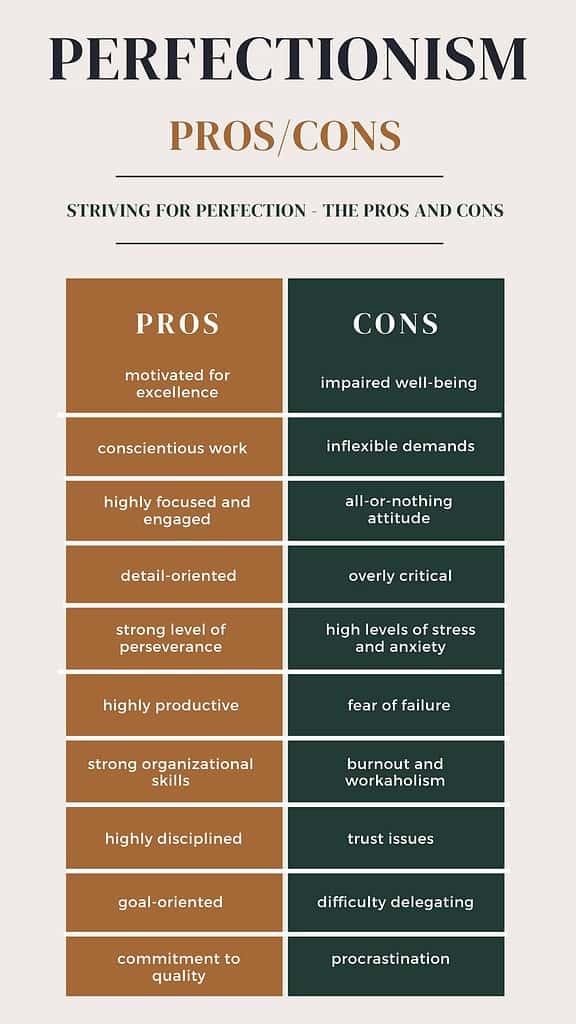Perfectionism: Striving For Perfection And Losing
Explore the profound effects of striving for perfection, navigating unrealistic standards, and the illusion of control. Embrace imperfection, and discover strategies for cultivating a healthy, more balanced life.

Striving for perfection can be a daunting, never-ending, never-accomplishing task. In reality, there is no such thing as perfection, and the endless pursuit of perfection for yourself and for those around you could have a negative impact on your health.
If I am honest, perfectionism and striving for perfection is a very strong personality trait in my family. Not just for me and my children but also, our entire family are perfectionists.
My mother and father were perfectionists when they were alive. They worked hard and had very high standards, and my brothers have perfectionistic tendencies as well.
It seems the perfectionist trait was very prominent in our family. My father was a military pilot, my mother called herself the CEO of our family (ha), and my brothers and I all gravitated toward a career path that required very precise, perfectionistic-type qualities; a pilot, engineer, doctor, and nurse.
In reality, none of us stood a chance!
The pros and cons of striving for perfection
According to the American Psychological Association, the definition of perfectionism is:
n. the tendency to demand of others or of oneself an extremely high or even flawless level of performance, in excess of what is required by the situation. It is associated with depression, anxiety, eating disorders, and other mental health problems.
American Psychological Association
Being a perfectionist and striving for perfection is not all bad, it can be a good thing under certain conditions. You wouldn’t want a pilot flying you across the world with a “good enough” attitude. Or an engineer building a bridge while thinking “It looks good from my house.”
Those seeking perfection can be highly motivated and tend to value the quality of their work. However, having extremely high expectations of oneself, and of others, can be an unhealthy mindset that causes stress, anxiety, and burnout.
Doing good work, healthy striving, and valuing the quality of your work are all great characteristics to have for professional and personal growth. But when we take it too far and put unrealistic expectations on ourselves, we can get into trouble.
Here is a list of the pros and cons of perfectionism. Not every perfectionist will exhibit these tendencies but striving for perfection can put you at higher risk.
The Pros and Cons of Perfectionism
Perfectionism Pros
Perfectionism Cons
There is still much debate and ongoing research over the nature of perfectionism and whether or not there are even any pros to being a perfectionist. Most professionals will tell you there is a difference between striving for perfection and striving for excellence.

Dimensions of perfectionism
Perfectionism is multi-faceted and there are many dimensions to being a perfectionist. While researchers still conflict over a single definition, some aspects of perfectionism can be more damaging than others.
A popular theory is that perfectionism, from an interpersonal perspective, is divided into three dimensions: Self-oriented perfectionism (SOP), other-oriented perfectionism (OOP), and socially prescribed perfectionism (SPP).
Self-oriented perfectionism – is the tendency to set an excessively high, or even unattainable goal, driven by the desire for one’s own personal success or fear of failure.
Other-oriented perfectionism – is when an individual sets excessively high, or unrealistic, standards for others, often accompanied by a strong desire for them to be perfect while doing so, which can lead to strained relationships.
Socially prescribed perfectionism – is an individual’s fear of rejection, and desire to be looked upon as perfect in the eyes of others. It is a belief that one’s worth is contingent upon perceived external standards and expectations driven by society.
There is nothing known as “Perfect”. It is only those imperfections which we choose not to see!!
Albert Einstein
Striving For Perfection: A Form Of Control
Striving for perfection often acts as a form of control, seeking to manage anxiety, stress, or uncertainty by imposing rigid rules and standards.
I know this is true for me. When Doug was initially diagnosed with Parkinson’s disease, we had a hard time. I tried to control every aspect of my life, and his life too.
I strived to be the perfect partner, nurse, and caregiver for him, which only exhausted me, made me irritable, and a terrible partner for Doug who really just needed my love and support, and not necessarily an advocate searching for all of the answers about Parkinson’s.
Perfectionistic rigidity can lead to mental health issues such as stress and depression, as the pursuit of being perfect becomes an attempt to regulate one’s own environment and emotions.
Being able to recognize the fact that true control doesn’t exist, is the first step in relinquishing control of the harmful cycle of perfectionism.
Coping With Uncertainty As A Perfectionist
Coping with uncertainty is a significant challenge for perfectionists. The unpredictability of life is a direct contradiction to their desire to control.
For me, I think one of the hardest things about being a caregiver and taking care of Doug, is that he has a chronic disease, which means there is no cure, and it is only going to progress as the weeks, months, and years go by.
Not knowing what to expect, or how quickly or slowly his progression would be, was initially terrifying, and I was running around with my head chopped off trying to figure out all of the answers.
Since then, in recent years, both Doug and I have learned to accept uncertainty, not just for his disease but also for life. Doug’s Parkinson’s is teaching us that we cannot control everything, and we must learn to enjoy all of it, the good days and the bad days.
Learning to embrace uncertainty is important to help loosen the reigns of perfectionism, and to foster resilience and adaptability in the face of life’s ups and downs.

5 Signs You May Be Losing To Perfectionism
Striving for perfection day in and day can feel like a never-ending battle. Like you and the world are never enough.
No matter what you do, it doesn’t feel like enough and you aren’t getting any satisfaction out of things. This is when one needs to do some strong self-reflection, and potentially see a professional who can help.
Here are 5 signs you may be losing to perfectionism.
- Mental health concerns – mental health issues start creeping in. Examples are things like stress, anxiety, obsessive-compulsive disorder, or eating disorders. Sometimes striving for perfection can exasperate mental health conditions that may have already been brewing.
- Isolation – feeling reluctant to get out in the world because you will only be disappointed can be a sign that perfectionism may be getting the better of you.
- Relationship issues – if you are starting to feel a strain in your relationships, that may be an indication that perfectionism has gone too far and is harming the relationships with the people you love.
- Procrastination – although some procrastination in our daily lives is perfectly normal, if perfectionism is causing you to delay taking action, out of fear of failure or imperfection, then that may be a sign it is interfering with your productivity and progress in life.
- Low self-worth – if perfectionism is causing you to feel consistently inadequate, or your self-esteem is tied to meeting impossibly high standards, then your striving for perfection could be adversely affecting your mental well-being.
Overcoming Perfectionism And Embracing Imperfection
Although I am still a perfectionist, I have become more gentle and forgiving with myself over the years. Part of the reason is that I stepped out of careers that fostered perfectionism.
Competing on a national level as a gymnast, and then working as a professional dancer meant that I spent much time striving for the perfect 10.
Intellectually I knew there was no such thing as the perfect body but aiming for that as a dancer felt like there wasn’t any other option. The “perfect body” meant more work, more work meant more money so I could pay my bills.
These days I embrace more self-compassion, relying less on external motivation in the pursuit of the perfection of beauty.

Steps Toward Becoming Perfectly Imperfect
These practical strategies will guide you toward your perfectly imperfect self, and help to foster greater self-compassion and forgiveness.
Here are steps to embrace imperfection.
Strategies For Change
Letting go of perfectionism isn’t easy. After all, it is a perfectionist aiming to be less perfect, which will take time and effort. So it is important to have a few strategies in mind when doing so.
Perhaps the most important first step is being mindful of your perfectionism. Just having the self-awareness of your striving for perfection is a big first step.
Recognizing perfectionistic thoughts is another important step. Sometimes we go about our days so quickly, and because perfectionism can be ingrained in our DNA, we don’t even recognize the thoughts of perfection that are racing around in our brains.
And we cannot make any changes if we don’t at least recognize what we are doing first.
Another great strategy to lessen perfectionism is to restructure negative thought patterns, by actively challenging and replacing them with a more positive perspective.
When we are working on perfectionism and trying to modify behavior, sometimes it is best done in small increments.
Gradual exposure to imperfection means stepping out of your comfort zone and adapting to less-than-ideal situations, which creates resilience and provides a healthier outlook on life.
Striving For Imperfection And Winning
Embracing imperfection is not a defeat but a victory in itself. It is a triumph over the relentless pursuit of perfection.
By letting go of unrealistic standards of perfection, we actually win through self-acceptance, resilience, and a more balanced and meaningful life.
Check out these additional posts for caregiver support
Let’s Connect
If you enjoyed this article, I would love for you to share it with friends and family members, or anyone you think might benefit from reading it.
Please let me know your thoughts in the comment section below. I’d love to hear from you.



